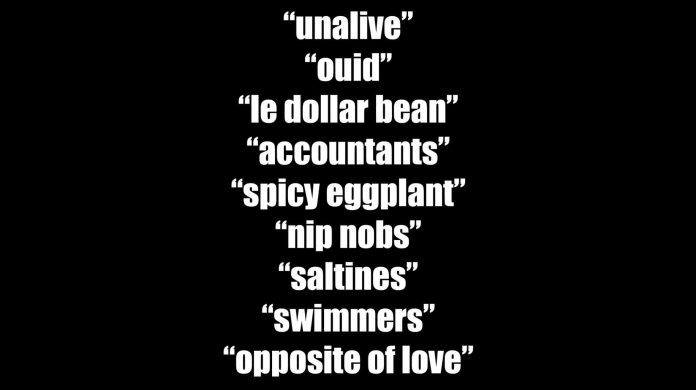Algospeak. It’s Official: I’m Even Older than I Thought
by Calico Rudasill, Sssh.com Porn For Women

Unlike some of my age-peer friends, I’ve never tried to “stay current” with things like pop culture, fashion, slang, social media hashtags or my annual physical checkups and recommended health screenings.
While I’m trying to be better about those last two things above, one of my nieces recently assured me that she unreservedly endorses the idea of me remaining openly clueless about all things millennial and ‘Gen Z’, from the music younger folks like to the lingo they use.
That said, I’m not completely out of touch – but that’s mostly because certain things haven’t changed much over the last 20 years. People still routinely use acronyms like LOL, SMDH, STFU, TLDR and GJKLOAHBPRSIT.
What’s that? You’re not familiar with the acronym “GJKLOAHBPRSIT”? It could be that you’re unfamiliar with the term because I just made it up on the spot right now. On the other hand, maybe the term is very meaningful, extremely funny and something you should google right now, if only because you’re going to experience significant FOMO until and unless you do so.
Algospeak: Lingo to Flummox Computer-Brains
A recent article for the Washington Post by Taylor Lorenz made me realize just how out of touch I have become with the language used by younger folks – specifically, the language used by younger folks when those younger folks are trying to get around algorithmic content filters.
This phenomenon, evidently, is called “algospeak” – which, to be clear, isn’t an acronym that stands for “All Leather Green Orangutan Still Preening Effortlessly Alaskan Ketchup.”
“Algospeak refers to code words or turns of phrase users have adopted in an effort to create a brand-safe lexicon that will avoid getting their posts removed or down-ranked by content moderation systems,” Lorenz helpfully explains. “For instance, in many online videos, it’s common to say ‘unalive’ rather than ‘dead,’ ‘SA’ instead of ‘sexual assault,’ or ‘spicy eggplant’ instead of ‘vibrator.’”
Among other things, this explains why my niece kept giggling the last time we went out for Chinese food, every time someone asked her to pass the eggplant.
According to the article, other algospeak code words include “nip nops” (nipples), corn emjois to indicate ‘porn’, “le dollar bean” (lesbian), “accountant” (sex worker), “leg booty” (LGBTQ) and terms like “panini” and “panda express” as stand-ins for “pandemic.”
Click Here for Hot Le Dollar Bean {Corn Emoji}!
Always quick to spot a theme – or to impose one of my own if there’s no organic theme to be had – I can’t help but notice that a fair percentage of these code words apply to things sex-and-sexuality-related.
On the one hand, this fact saddens me greatly. I mean, people shouldn’t have to speak in code to have honest conversations about things like… well, you know… their pee-pees and their hoo-hoos.
On the other hand, I also can’t help but notice how bizarre a description of a lesbian porn scene would become, if rendered in algospeak.
Imagine, for example, that a traditional gonzo porn studio – one of those outfits that isn’t too concerned with sex positivity or political correctness – decided to use algospeak to describe a new scene. I imagine it coming out something like this:
“Don’t miss the hottest le dollar bean {corn emoji} scene released since before the start of the panini! Watch as Lilly Licksit straps on a spicy eggplant and gives it to her partner, rising star accountant Dolly Doumi! Once Dolly has had her fill, she returns the favor by slurping Lilly’s nip nops! Join now to watch the very best le dollar bean seggs ever flitzed on the impterwobs!”
See? Isn’t that more fun than actual gonzo porn text, like: “Chloe Temple and her girlfriend Kenzie entered a contest to have Adriana Chechik come to their house and teach them how to squirt. When they end up winning, Adriana comes over and covers everyone in squirt.”
Booo-ring. Wouldn’t it be more fun to read about Adriana coming over to teach Chloe and Kenzie how to “squander,” or to “squizzle,” or perhaps even to “sasquatch”?
You know what? For the first time since I became a middle-aged person, I find myself wanting to get a better command of the jargon of younger folks. Maybe some helpful Gen Z’er can give me a few tips if I cluck the blink in her lio?








 Erotic Cinema For Discerning Adults
Erotic Cinema For Discerning Adults Anonymous Adult Search
Anonymous Adult Search